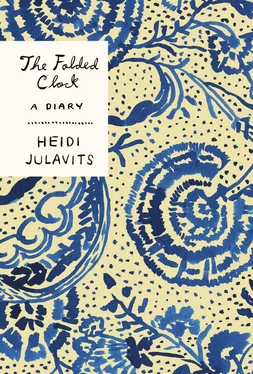But my failure to give, in this instance, wasn’t a failure of generosity. It wasn’t a “cutthroat” desire to beat someone, or a crazy quasi-erotic need for an object. The truth was that I wouldn’t respect myself if I gave the woman this bed. I wouldn’t respect myself for being incapable of saying, “I really want this bed, I won it fair and square, and I am not going to give it to you out of guilt.” (I basically said this by saying, “I’m sorry.”) If I’d given the bed to the woman, I’d have done so passive-aggressively. I’d have done so to make her feel bad for making me do something I didn’t want to do, and that, by the laws of Maine yard sales, I didn’t need to do. But if I’d given her the bed, she wouldn’t have felt bad, not for a moment. And I would have felt like an idiot for giving up a bed to make a point that nobody got, not even me.
Today my husband and I went on a date to the Wannsee Conference house. The Conference house is on the opposite side of the German lake from where we’re living, and is a villa much like ours, save for the fact that in its dining room on January 20, 1942, Eichmann, Heydrich, Müller, and other notable Nazis gathered to draw up their official Jewish extermination plan, euphemistically referred to in the conference minutes as the “Final Solution.” (I have since learned a bit more about the history of our villa. During the war, following its seizure from a prominent Jewish banking family, our villa became the home of Hitler’s “economic guru,” a man named Walther Funk, whose work for the Third Reich earned him the name “the Banker of Gold Teeth,” a moniker referring to the practice of extracting gold teeth from concentration camp inmates so that they could be sent to the Deutsche Reichsbank — of which he was president — and melted into bullion. So the similarities between our villa and the villa across the lake, one can assume, extend beyond architecture and waterfront proximity. Though I have no doubt that the topic of extermination was, on numerous occasions, also discussed in the dining room of our villa, these remarks were unofficial enough that no museum is warranted to memorialize them.)
To get to the Conference house my husband and I biked past rowing clubs and yacht clubs and minischlosses, and along the way my mood started to tighten. I could not entirely blame Hitler. This just happens on some days, even when mass murder tourism isn’t on the date docket. We rounded the corner onto the street where the S-Bahn is located, and the mean beer-and-wurst seller I’ve made it my goal this fall to befriend, and it was as if I’d pedaled into an unpleasant new weather system. I saw my husband biking ahead of me and decided, because I had no better explanation, that he was somehow to blame for the alienation I’d been vaguely sensing all day and that had finally coalesced into the more solid (and paranoid) beginnings of a depression. By plain virtue of the fact that he existed and he loved me, he was at fault. I thought of the recent invitation he’d received to go to Paris, and of the many readings he’s giving in Germany and elsewhere in the upcoming weeks. Here, in this country, at this villa, I am a spouse; literally, this is how I am referred to on the villa itineraries he has received, i.e., “dinner for fellows and spouses.” My spousehood even required documentation. We had to produce a marriage certificate in order to secure my official welcome. (Apparently many people try to pose as the spouses of fellows; the fakes must be ferreted out.)
None of this, until today, had bothered me.
We arrived at the Wannsee Conference house; we parked our bikes. Standing in the beautiful gardens, reading the history of the villa on a placard, I was struck — as most people who visit the villa, at least according to the placard, are struck — by the uncomfortable collision of “idyll and violence.” This made me think of my husband’s and my favorite movie, an Austrian film in which a lakeside summerhouse is invaded by murderers who first toy with the family before killing them one by one, including the child. Years ago, when we were first dating, we rented this movie — from a Maine video store stocked with old blockbusters and about six foreign films — knowing none of the plot in advance. The title was in German, the blurbs and the descriptions were in German. We met this movie cold.
In the gardens, I made mention to my husband that possibly the director of this movie we’d seen so many years ago had been thinking of the uncomfortable collision of idyll and violence prompted by the likes of the Wannsee house. If I’d been a critic in Austria or Germany writing about this movie when it first came out (in 1997), I’m sure I would have thought about idylls and violence, and how, not so long ago, many people were hanging out in lake houses or regular old houses while elsewhere people were definitely not doing that.
What I was not saying but trying to say: We are on a sort-of date at the Wannsee Conference house, but I am struggling not to feel really alone here, and also not to be angry at you for absolutely no reason . This movie is important to my husband and to me. It signals that we had a history of liking things together, and of seeing the world similarly. I needed reminding of that.
But I also wanted confirmation that my inexplicable, unjustifiable resentment of him was explicable and justified. I was fairly committed to this mood I was in; I less wanted to overcome it than I wished to stumble upon an excuse to more fully realize it. So I lay in wait. There was no escaping me. My husband said of my observation about idylls and violence, “That’s not what that movie was about.” Then he told me what the movie was about. This, at least, is how I chose to interpret his response.
I grew indignant. As if I needed anyone to tell me what that movie was about! I recalled another movie we’d watched together in our early days, in which a New Age character says to his non — New Age dinner guest, “That’s funny, you’re telling me about chakras.”
This was my inner chorus as we walked through the Wannsee Conference house and took pictures of anti-Semitic children’s books. That’s funny you’re telling me about chakras. That’s funny you’re telling me about chakras . I also sensed — or wished to sense, in the interests of fully realizing my bad mood — an increasing emotional divide between us. My husband stopped talking to me; he wandered off on his own. This sounds ridiculous, and is ridiculous, but I decided that my husband believed he had a deeper connection to the material and the exhibit because he is half-Jewish and I am (possibly) not Jewish at all.
In my head, I started a fight with my husband. I argued in favor of my possible Jewishness, and thus my right to walk around the museum as his equal. The spelling of my last name was created on Ellis Island, and only the direct descendants of my great-grandfather have the exact arrangement of letters; phonetically, however, there exist many potential “relatives” in the States, and every one of these potential relatives is Jewish. I am occasionally contacted by members of these phonetically identical families whose names are spelled “Shulawitz” or “Jewelowicz;” they say, “I heard you mentioned on the radio. I thought perhaps we might be related.” Recently I was asked to be on a panel; when I declined, the organizer said, “Could you possibly recommend another female Jewish novelist?”
(Also — this is unrelated yet somehow not — Hitler and I share a birthday. This has always made me suspect that people subsconsciously believe I am somehow complicit in the killing of Jews. It has also made me vigilant with myself. According to the laws of horoscopes, I might be an enthusiastic organizer possessed of incredibly bad ideas. Every instance of group inspiration requires a gut check. What are the possibly really negative long-term ideological ramifications of this Fourth of July parade float? If I were Jewish, I would be relieved of a great deal of probably pointless self-doubt.)
Читать дальше












